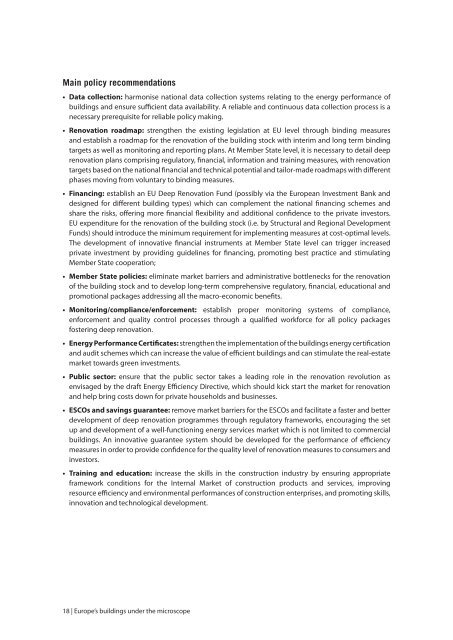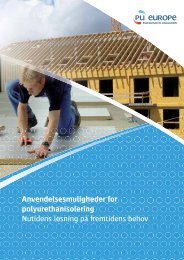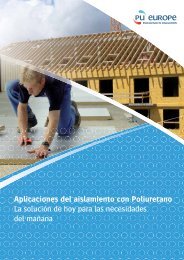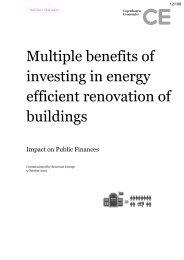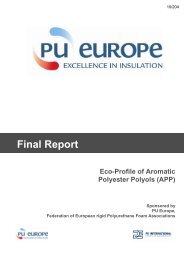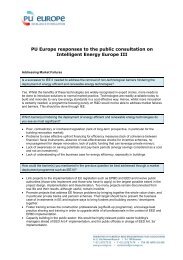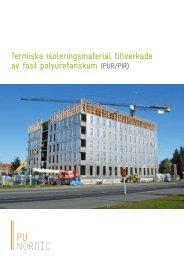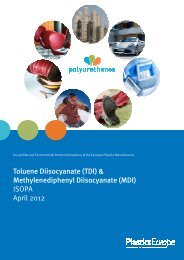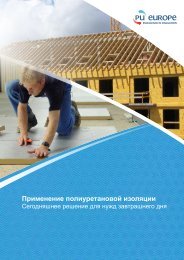BPIE: Europe's buildings under the microscope - PU Europe
BPIE: Europe's buildings under the microscope - PU Europe
BPIE: Europe's buildings under the microscope - PU Europe
Create successful ePaper yourself
Turn your PDF publications into a flip-book with our unique Google optimized e-Paper software.
Main policy recommendations<br />
• Data collection: harmonise national data collection systems relating to <strong>the</strong> energy performance of<br />
<strong>buildings</strong> and ensure sufficient data availability. A reliable and continuous data collection process is a<br />
necessary prerequisite for reliable policy making.<br />
• Renovation roadmap: streng<strong>the</strong>n <strong>the</strong> existing legislation at EU level through binding measures<br />
and establish a roadmap for <strong>the</strong> renovation of <strong>the</strong> building stock with interim and long term binding<br />
targets as well as monitoring and reporting plans. At Member State level, it is necessary to detail deep<br />
renovation plans comprising regulatory, financial, information and training measures, with renovation<br />
targets based on <strong>the</strong> national financial and technical potential and tailor-made roadmaps with different<br />
phases moving from voluntary to binding measures.<br />
• Financing: establish an EU Deep Renovation Fund (possibly via <strong>the</strong> <strong>Europe</strong>an Investment Bank and<br />
designed for different building types) which can complement <strong>the</strong> national financing schemes and<br />
share <strong>the</strong> risks, offering more financial flexibility and additional confidence to <strong>the</strong> private investors.<br />
EU expenditure for <strong>the</strong> renovation of <strong>the</strong> building stock (i.e. by Structural and Regional Development<br />
Funds) should introduce <strong>the</strong> minimum requirement for implementing measures at cost-optimal levels.<br />
The development of innovative financial instruments at Member State level can trigger increased<br />
private investment by providing guidelines for financing, promoting best practice and stimulating<br />
Member State cooperation;<br />
• Member State policies: eliminate market barriers and administrative bottlenecks for <strong>the</strong> renovation<br />
of <strong>the</strong> building stock and to develop long-term comprehensive regulatory, financial, educational and<br />
promotional packages addressing all <strong>the</strong> macro-economic benefits.<br />
• Monitoring/compliance/enforcement: establish proper monitoring systems of compliance,<br />
enforcement and quality control processes through a qualified workforce for all policy packages<br />
fostering deep renovation.<br />
• Energy Performance Certificates: streng<strong>the</strong>n <strong>the</strong> implementation of <strong>the</strong> <strong>buildings</strong> energy certification<br />
and audit schemes which can increase <strong>the</strong> value of efficient <strong>buildings</strong> and can stimulate <strong>the</strong> real-estate<br />
market towards green investments.<br />
• Public sector: ensure that <strong>the</strong> public sector takes a leading role in <strong>the</strong> renovation revolution as<br />
envisaged by <strong>the</strong> draft Energy Efficiency Directive, which should kick start <strong>the</strong> market for renovation<br />
and help bring costs down for private households and businesses.<br />
• ESCOs and savings guarantee: remove market barriers for <strong>the</strong> ESCOs and facilitate a faster and better<br />
development of deep renovation programmes through regulatory frameworks, encouraging <strong>the</strong> set<br />
up and development of a well-functioning energy services market which is not limited to commercial<br />
<strong>buildings</strong>. An innovative guarantee system should be developed for <strong>the</strong> performance of efficiency<br />
measures in order to provide confidence for <strong>the</strong> quality level of renovation measures to consumers and<br />
investors.<br />
• Training and education: increase <strong>the</strong> skills in <strong>the</strong> construction industry by ensuring appropriate<br />
framework conditions for <strong>the</strong> Internal Market of construction products and services, improving<br />
resource efficiency and environmental performances of construction enterprises, and promoting skills,<br />
innovation and technological development.<br />
18 | <strong>Europe</strong>’s <strong>buildings</strong> <strong>under</strong> <strong>the</strong> <strong>microscope</strong>


